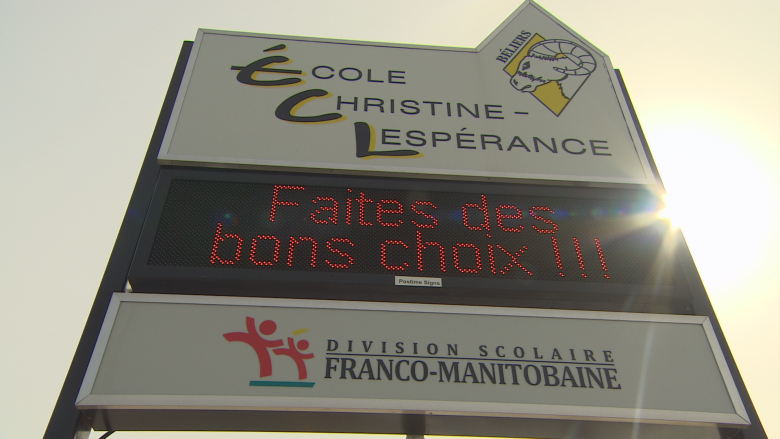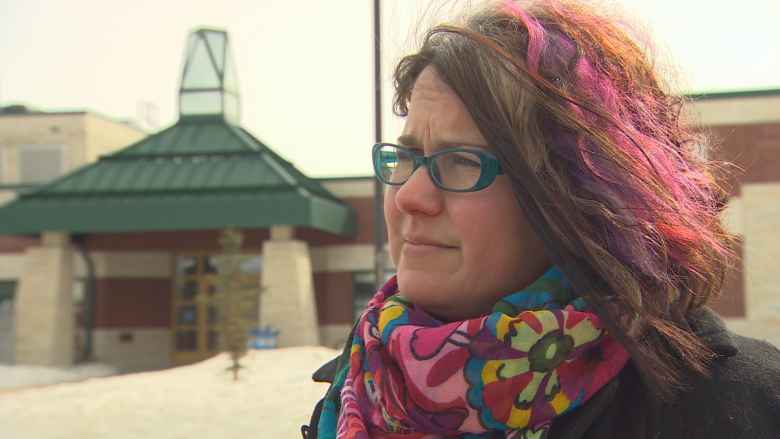Catholic class has no place in public French school, Winnipeg parents argue
Dozens of parents are pushing back against a French school in Winnipeg they say should get with the times and not be allowed to offer Catholic coursework during school hours.
"I think we're on the right side of history with this," said Nicole Rosen, a University of Manitoba linguistics professor and mother of two students at École Christine-Lespérance in South St. Vital.
"We know that the face of French Manitoba has changed a lot over the years, and we'd like the school's programming to reflect that diversity."
École Christine-Lespérance and 24 schools are part of the provincially regulated Franco-Manitoban School Division (DSFM).
The school is currently offering an optional catechism course. Rosen and other parents disapprove and have started a petition against allowing the course to be held during school hours.
As of late last week, Rosen said well over 100 people had signed the petition.
"We believe that the religious instruction offered in schools during the school day is not compatible with the Franco-Manitoban School Division's commitment to promote an inclusive policy and practice," reads an English translation of the French petition. "We then ask that religious classes be offered outside of school hours to eliminate exclusion in our schools."
But Bernard Lesage, board chairperson for the division, said no one is forcing students at the school to take the Catholic course, and neither the division nor École Christine-Lespérance are playing favourites with the Catholic faith.
'Not imposing' Catholicism
"We're not imposing any religious exercise," he said.
Currently the 45-minute religious instruction at École Christine-Lespérance takes up the last 30 minutes of class before lunch and extends 15 minutes into the noon hour. The class is held once a week.
Generally speaking, students in the DSFM who don't wish to participate in catechism can opt out or attend "classe de morales" where they learn about "basic moral guidelines" like respect, Lesage said.
École Christine-Lespérance also offers students the opportunity to use the time for fitness activities, Lesage added.
Because the division falls under provincial jurisdiction, it must abide by provincial rules. That includes following legislation passed in the late 1800s that mandates the division offer religious schooling if enough parents express interest in such classes, Lesage said.
Under the Public Schools Act, public schools may offer religious instruction if a minimum of 25 parents, or the parents of at least 10 children, request such coursework.
Tom McMahon, former general legal counsel for the Truth and Reconciliation Commission, said he was surprised to learn of the catechism classes being offered at the public school.
"Catholic classes in a public school are contrary to the principle of separation of church and state," he said.
McMahon said he supports No. 64 of the TRC's list of 94 calls to action, which recommended "all levels of government that provide public funds to denominational schools to require such schools to provide an education on comparative religious studies, which must include a segment on Aboriginal spiritual beliefs and practices developed in collaboration with Aboriginal Elders."
Other religions eligible
The division would follow suit with the creation of a course on any other religion if the demand and minimum requirements were there, Lesage said.
"We're not favouring any religion. The same would apply to be it Islam or Judaism. The same criteria would apply," he said.
"If parents would want Islam taught and they do their survey and have the percentages needed to have it, we would follow our own bylaw and do the same thing."
Offering the religious instruction during school hours is also ultimately at the discretion of school principals, Lesage added.
Rosen said thus far the only voices that have been heard on the issue have been those of parents who want the course during normal school hours.
In the fall when there was a push for the instruction to happen after school, some parents complained that it conflicted with bus schedules and caused issues getting their kids home, or otherwise cut into the students' down time.
Privilege concerns
Rosen said continuing to offer religious instruction in the school flies in the face of the division's most recent strategic plan, which values inclusive programming.
In addition to diversity in the student body, there are some parents who are anglophone, can't speak French or don't identify with the Catholic faith, Rosen said.
"There are Muslims, there are Jews, there are atheists, there are people with all sorts of backgrounds, and we'd like to see the programming reflect that," she said.
"We think it's quite reasonable to expect that these classes be held outside of class hours. We absolutely want people to have access to these catechism classes, it's an important traditional part of French-Canadian identity, but we don't want to have one group that's privileged over top of the other group."
Lesage anticipates the issue will come up at the next school division meeting on March 22.


